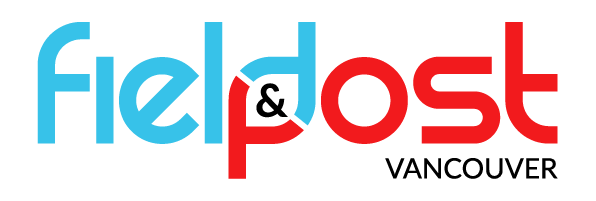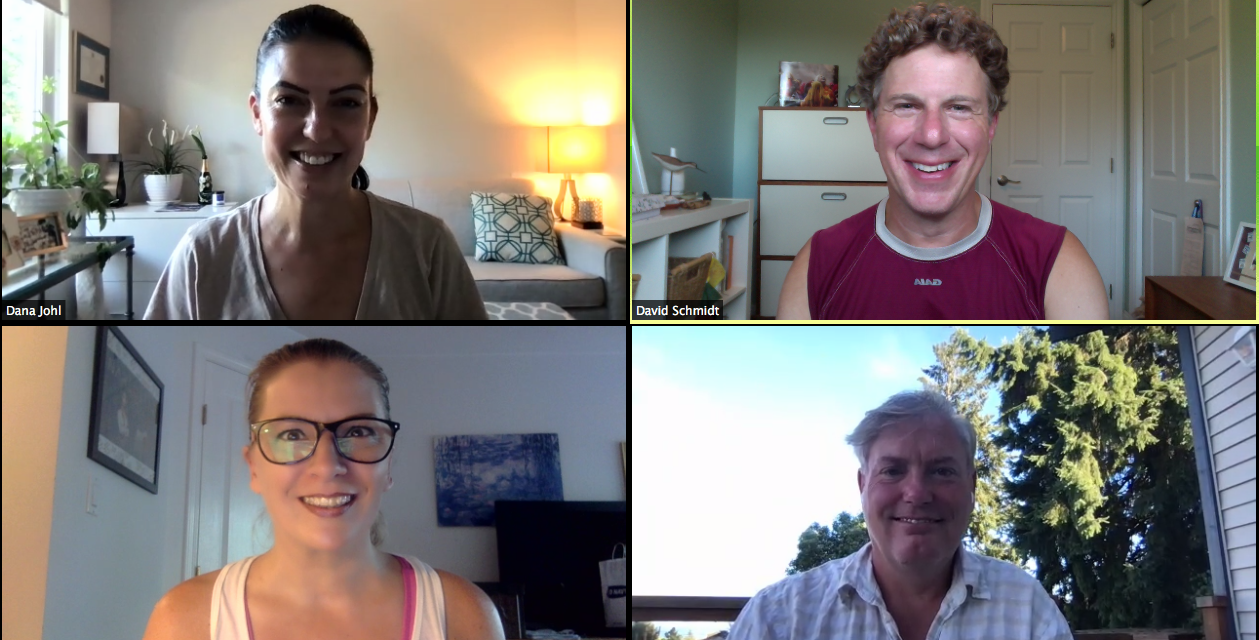On a very warm evening during the “heat dome” days of this past summer, F&P Board Member David Schmidt sat down (virtually) with the founding members of Field & Post: Kate Green, Dana Johl and Robert Hardy. Up for discussion was how the organization we all know and love came into existence, as well as aspirations for its future.
Where did the idea of Field & Post come from?
Kate Green: To be fair, Ed Hatton and Scott Winlaw had tried to get some group drinks happening way before.
Rob Hardy: And I remember Deb Wilton used to organize this group called EDS, the Event Drinking Society, that a bunch of us in post would go out to.
Kate: But then Rob and I went out for drinks and we were talking about it, and thought that we should get sponsors.
Rob: And I remembered back before I lived in Vancouver, when I lived in Winnipeg, a bunch of us in the industry there realized that we wanted to have somebody else pay for our drinks, so we convinced one of the banks to sponsor our group. I think we called it First Fridays. And I was like, if we can convince them there to do that, I think we can get people to pay for drinks here.
Kate: There was definitely a need.
Rob: And then, Dana, you and I were involved in crewing up some show, and we were just trying to find people, and we were like, “Who’s out there who does this?” And we were like, “Maybe we should get them all in a room together so we can all meet each other.”
Dana Johl: And I don’t know if this is true or if this is what you guys just told me, but after you guys went for drinks you told me that you’d said, “Who else can we get to be involved?” And you were like, “Well, Dana, because then things might actually happen.”
Rob: That’s totally true.
Dana: And I think after that we started to find sponsors. And we had our first event at the Sin Bin. And I think it was 2013.
Rob: That sounds right.
Kate: Fact check it.
(The first Field & Post event was indeed in 2013.)
How did the first event go?
Kate: We didn’t have a mailing list or a website or anything – we just started a Facebook page and put invites out. At the beginning of that first event, I just remember it was kind of like when you have a party and you go, “Oh my God, are people gonna show up?” And I thought, if we get 20 people, then it’s a success. But we had like, 120 people show up that first time.
Dana: I remember I did the door. I was frantic, trying to take people’s names and email addresses and give out drink tickets, and it was backed up – and obviously we changed that system. We even gave prizes.
Kate: Michael Francis won all the prizes, usually.
What was the journey from casual drinks to a member organization?
Dana: The evolution was, first we decided to make it an official not-for-profit. So we incorporated a company, because we thought if we were getting people to give us money we should make it legit. But we didn’t have official members for quite a few years. And then we decided to change our bylaws to allow voting membership and started charging a membership fee.
Rob: Really, this was about the community. We created it for all the people that work in the business, so we wanted them to get to be a part of it. To feel a sense of ownership. And the other part of it was, you know, it’s a lot of work. And we wanted to start sharing that work with other people.
(Laughter)
Kate: Right.
So how did you three sort out your roles as founders in those early years?
Kate: It was rock, paper, scissors.
(Laughter)
Dana: I think it was natural. I gravitate towards certain things, like the finances. Kate’s a great networker. Rob really, really shone as far as the sponsorship stuff went. I think we were just a good mix of people with different skills and interests.
Rob: I used to be a fundraiser – that’s what I used to do for a living.
Dana: I’m the shy one, so I would start out doing the door, because then it was easier for me to say hi to everybody than to just walk around and small talk.
Kate: And I’m very good at parties.
(Laughter)
Did the organization grow as you expected it would?
Dana: More than we expected it would.
Kate: Yeah. When we started Field & Post, it was about, “What do we do to support the industry?” After a few years we thought, let’s try to bring in an educational component, so that we on the west coast become known for having really great talent, upgrading their skills.
Dana: When we decided to do it, remember the interviews we did with event planners?
Kate: Oh, yeah.
Rob: God.
Dana: And then we just absolutely fell in love with Amber (Orchard).
Rob: In the scripted side of the business, you’ve got the unions, you’ve got the schools, everybody’s really focused on training there – nobody’s focused on training in unscripted and lifestyle and documentary and reality. So we were it. That, I think, became the thing that made us really stand out. It wasn’t just another drinking event, it was like, hey, we’re trying to help people advance their skills and career.
Kate: Now, there’s opportunities for people to learn.
Rob: For me the highlights were to see how interested all the partners and sponsors were to be a part of it.
Dana: I’m blown away that were basically a go-to for Creative BC and Telus and the CMPA – sometimes they come to us with ideas and look to us to be leader in B.C. We’re all super proud of that. Didn’t expect that.
Kate: What I really liked is that a lot of the executives of the production companies around town really saw the value of it. They’d promote it within their companies.
Rob: They went from being scared that we were starting a union to realizing that this was really beneficial for them too.
(Laughter)
Where did the idea of FactualWEST come from?
Kate: I think it was just a natural evolution of what we were doing.
Dana: Rob was pretty vocal about it, and I remember thinking, “Oh, that’s a little intimidating.” Not to execute it, but how are we going to raise enough money to do that? Rob really led the way on the sponsorship, and we started to see that there was interest. That’s when Amber helped us turn it into a venue-based event.
Rob: Events are great because they bring people together. There’s all these fantastic events in our industry where people get together to talk about scripted or digital, or go to Banff to sell their TV show – but there was nothing for people who work in factual television. So it was like, “Well, let’s create a day where people can come together and feel a sense of community.” At the same time, John Ritchie and Mark Miller and a couple of other people were going, “It’s really hard to find showrunners, it’s really hard to find fantastic, top-level talent. How do we train people up?” And we were like, maybe this could help. So they got behind the idea, and they helped us get a little more credibility, and then we just started talking to all the different sponsors and partners who could see the potential. It was the right idea at the right time.
What were the challenges of organizing that first FactualWEST?
Rob: Money.
Kate: Money, yeah.
Rob: Time. Faith. Fear.
And the highlights?
Kate: The first couple of years Cheryl Binning was heavily instrumental in the programming with me, and it was good to have that balance between myself and my producer mind, and Cheryl and her story perspective.
Field & Post is now in the planning stages for its sixth FactualWEST. Has the conference grown as you expected?
Kate: Absolutely. We’ve gone from one day (of events) to two. We’ve gone from having people from the United States and Canada as our speakers to international speakers from Australia and the U.K. I think this might be our last year in the venues that we’re in – I think we’re starting to outgrow those venues. We’ve just got to keep building, and hopefully we’ll have more participants come from out of town.
What made you decide to expand the Board from the three of you to a much larger group? (The F&P Board currently has 11 members.)
Dana: It’s because we always wanted to kind of give it away. Like Rob said, we wanted to give it back to the community, so what better way to do that than to open it up for anybody to support?
Rob: That’s part of why I left the Board. Not because I don’t love the organization, and didn’t love being a part of it, but I have a big, loud voice and lots of opinions, and I needed to make some room for other people.
What do you see in the future for Field & Post and FactualWEST?
Kate: I think FactualWEST will just continue to get bigger and bigger. My dream would be to see it become the go-to networking and skills development conference in Canada for factual TV workers. Field & Post expanded to Victoria – one day it would be great to see membership across Canada.

